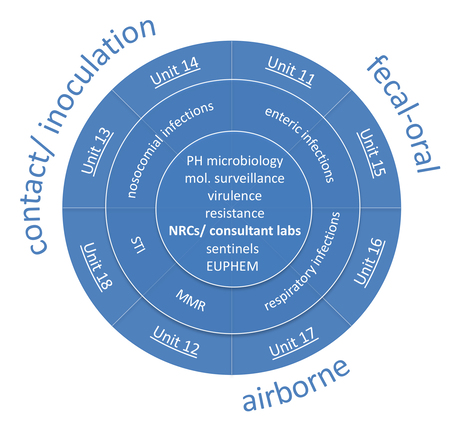Department 1: Infectious Diseases
- Head:
- Sascha Al Dahouk
- Deputy:
- Annette Mankertz
Tasks
According to our mission "protecting health, exploring health risks" and the role of the Robert Koch-Institute as a central institute of the German Federal Ministry of Health in the field of application and action-oriented research, Department 1 - Infectious Diseases - is engaged in central tasks of the Institute, dating back to its founding director.
We act in implementation of the German Protection against Infection Act (IfSG) for the purpose of recognizing, preventing and combating infectious diseases as well as making a significant contribution to knowledge about the etiology of infectious diseases and its transfer into practice.
Department 1 fulfills these tasks with the ambition of being a reliable partner and competent expert to answer questions concerning the detection, characterization and inactivation of infectious agents relevant to public health in Germany. This is pursued on the basis of laboratory based science.
Structure and Methods
In the department, human pathogens important in terms of both, public health impact (e.g. spreading or severity) and paradigmatic scientific aspects, are analyzed and characterized by microbiological, molecular biological, biochemical, cell biological and immunological methods to elucidate properties relevant for identification (diagnostics) as well as the prevention and control of the respective diseases. These aspects include pathogen-specific factors influencing the course of infection and the spread of pathogens. Consequently, mechanisms of pathogenicity, virulence, and immunity are investigated focusing on variations present in the population and the emergence of new properties such as immune escape and antimicrobial resistance.
In addition, the ability of infectious agents to survive in hostile environments including the presence of inactivating substances is examined in suitable models.
The bacteria, viruses, fungi and parasites investigated in the Department encompass a whole spectrum of endemic and scientifically paradigmatic pathogens as shown in Table 1.
Table 1 – Department 1: Spectrum of mainly endemic as well as scientifically paradigmatic pathogens
Currently circulating as well as outbreak-derived agents are actively collected via sentinels and in collaboration with regional public health authorities, hospitals, universities, and laboratory networks.

 Source: © RKI; Manuel Frauendorf, skyfilmberlin; RKI
Source: © RKI; Manuel Frauendorf, skyfilmberlin; RKI
Dissemination and transfer of knowledge into practice
Common to all units is the dissemination of gained knowledge on the basis of research results and findings. This is secured through participation in national and international expert committees, through reports to the German Federal Ministry of Health, the publication of original findings and reviews in the publication media of the Robert Koch Institute including the RKI website, and in national and international peer-reviewed journals.
The continuing education of public health authorities, young scientists and students in the field is performed within a curricular framework (e.g. EUPHEM, RoKoDoKo) and in courses, workshops and symposia.
Service
The Department Infectious Diseases includes 5 National Reference Centers, 5 National Consulting Laboratories as well as 2 WHO Regional Reference Laboratories. The spectrum of services includes special diagnostic, molecular surveillance, the availability of extensive strain collections and pro-active engagement in quality assurance as well as the provision and availability of appropriate expertise for the respective agents and the correct interpretation of laboratory-based data.
The department hosts the Commission for Hospital Hygiene and Infection Prevention (KRINKO), a national scientific committee that develops national guidelines for infection prevention and control, as well as the Polio Commission supervising the respective eradication program. The prevention strategies for infectious diseases developed in these commissions are implemented in cooperation with the federal states, e.g. by promoting regional networks to combat the spread of bacteria resistant to antibiotics (AMR).
Collaboration
Department 1 works closely together with the Department "Centre for Biological Threats and Special Pathogens (ZBS)" and Department 3 "Infectious Disease Epidemiology" of the Robert Koch Institute. Further on, the department collaborates with other national and international institutions including ECDC and WHO on questions of etiology, diagnostics, inactivation of pathogens and pathogenesis.
Research
Current research activities are pursued in cooperation with the other departments and units and focus on scientific areas as defined in the RKI’s research agenda. Research is application and action-oriented and focusses on the characterization of variants of agents obtained by the sentinels and the activities of the national reference centers (Figure 1).
 Figure 1: Core competencies of Department 1: Infectious Diseases. Source: © RKI
Figure 1: Core competencies of Department 1: Infectious Diseases. Source: © RKI
to the top





